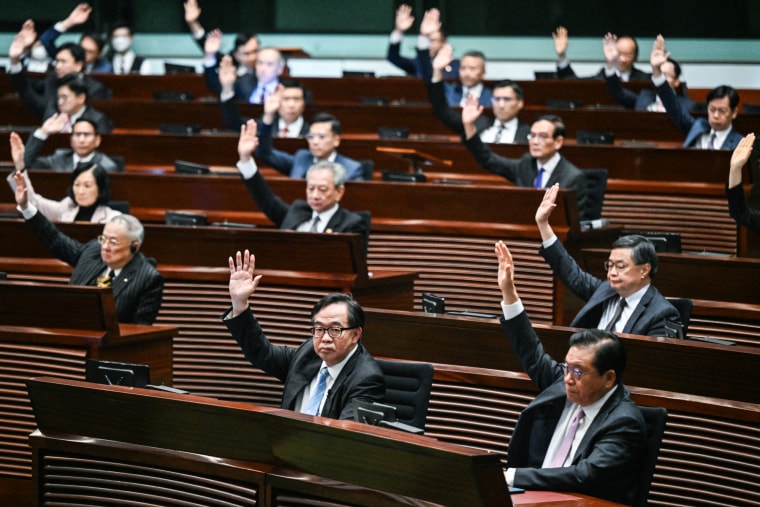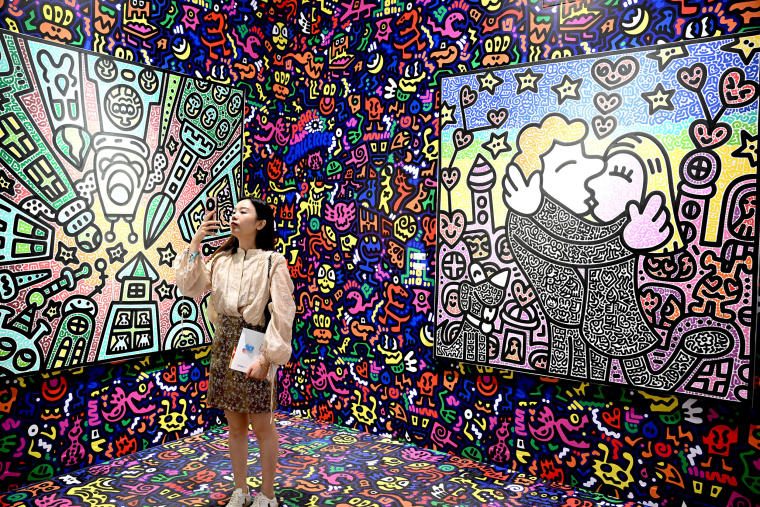Achi news desk-
More than 240 international galleries are taking part in Art Basel this year, as it returns to full scale for the first time since before the pandemic. A related Art Week event, Art Central, features nearly 100 galleries from Hong Kong and around the world.
Both events have been packed with people this week, both serious art buyers as well as casual ticket holders taking photos and selfies.
The government provided 15 million Hong Kong dollars ($1.9 million) to Art Basel from a fund aimed at promoting major arts and cultural events, which also supported Art Central. Officials see such “mega events” as a way to revive Hong Kong’s economy and international reputation, battered by years of pandemic isolation and the crackdown on dissent.
Hong Kong’s Culture Secretary Kevin Yeung told lawmakers on Wednesday that the government is “committed to promoting Hong Kong as an East-meets-West center for international cultural exchange,” citing the city’s low tax rate and strategic location in Asia .
Art Basel has played down concerns about freedom of expression.
“We have never faced any censorship issues in our shows, and we have not been asked to do anything differently since the introduction of the National Security Law,” a spokesperson said in a statement. “As with all Art Basel shows, our Selection Committee is responsible for reviewing applications and selects galleries based solely on the quality of their booth offering.”
But that masks the self-censorship that galleries may now feel is necessary to include in major art fairs, says Wear, who issued a statement last year urging the international artistic community not to participate in the event Art Basel in Hong Kong.
“They don’t have to do it because everyone is doing it for them,” he said.
Clashes over disputes strike against Hong Kong’s cultural ambitions
The Hong Kong government has been investing heavily in the city as a cultural hub, opening the M+ art museum in 2021 and the Hong Kong Palace Museum in 2022. And the world’s largest auction houses continue to express confidence: Phillips opened its headquarters New Asia in Hong Kong in 2023, to be followed by Christie’s and Sotheby’s later this year.
But Hong Kong’s cultural development has coincided with a crackdown on dissent in the name of national security, raising tough questions for international art companies that don’t want to miss out on commercial opportunities.
“They know they have a problem, but they don’t want to talk about it,” said Danish sculptor Jens Galschiot. “Because the second they talk about it, then they have to face it.”
In 2021, a sculpture by Galschiot commemorating the victims of the 1989 Tiananmen Square crackdown on pro-democracy protesters in Beijing was dismantled and removed from the University of Hong Kong, where it had stood since 1998. University officials said they had removed r statue, known as the “Column of Shame,” “based on external legal advice and risk assessment.”
Hong Kong officials have made it no secret that art could be targeted. The city’s security chief, Chris Tang, said in a letter to Galschiot last year that those seeking to endanger national security could use “artistic creations” as an excuse.
Alexandra Yung, a local artist, art collector and art consultant, said there was a feeling of “anxiety” among Hong Kong’s artistic community, some members of which have moved abroad. Artists now have to be “a little more aware and more responsible,” he said, amid uncertainty about where the “red lines” are drawn.
While in recent years Hong Kong Art Week events have featured art related to local politics, Yung said this year “she didn’t see anything that was political at all.”
“I think galleries are more aware of what they would show and what they wouldn’t show,” he said.
Hong Kong was required to pass the Article 23 law under its tiny constitution, known as the Basic Law, but a previous attempt was abandoned in 2003 when an estimated 500,000 of Hong Kong’s 7.5 million people took to the streets in protest. Since the national security law was introduced in 2020, however, Hong Kong’s pro-democracy opposition has been all but eliminated, and this time the bill sailed through the legislature, where it passed unanimously on March 19.
The law has been criticized by the US and others, with Secretary of State Antony Blinken saying it “threatens to further undermine the rights and freedoms of people in Hong Kong.”
The Hong Kong government condemned Blinken’s comments as “misleading and erroneous,” saying the law is precisely targeted, its crimes and punishments are clearly defined and established freedoms will be protect

Among the aspects of the new local law of greatest concern to artists is rioting, a British colonial-era crime that Hong Kong officials have resurrected in recent years, said Eric Yan-ho Lai, a research fellow at Georgetown Asian Law Center.
The new law expands the crime of terrorism, defined as inciting hatred or disaffection towards the Chinese and Hong Kong governments, and raises the maximum penalty from two years in prison to 10.
“There is already strong self-censorship in Hong Kong in the past few years,” Lai said, pointing to the removal of politically sensitive books from public libraries and schools.
During Hong Kong Art Week last year, a video installation by an American artist was removed from a billboard outside a department store after it was discovered that it was secretly paying tribute to the 2019 protesters, of whom more than 10,000 have been arrested .
In August, a long-running mural was removed from outside a restaurant popular with construction workers because it depicted customers eating noodles while wearing yellow hard hats, a color associated with pro-democracy protesters.
In recent months, national security considerations also appear to have played a role in the cancellation of multiple performances. In January, organizers of the Hong Kong Drama Awards said they had been informed that the government-funded Hong Kong Arts Development Council was withdrawing support for the first time in more than two decades over reputational concerns.
Among the reasons cited by the council was the invitation of “non-theatrical people” as presenters at last year’s awards, including the controversial political cartoonist called Zunzi.


Lai said the increased legal risk brought by the Article 23 law would exacerbate self-censorship, which in turn would “make Hong Kong less vibrant and pluralistic and further encourage artistic communities from abroad to visit Hong Kong.”
The effects of self-censorship could also spread from Hong Kong to the wider world, Wear said, noting that Western galleries and other arts institutions have rarely wrestled with such restrictive laws in an art market as large as Hong Kong. Like Beijing’s national security law, Article 23 law claims global jurisdiction.
“If you’re a dealer bringing work to, say, Art Basel, or if you have an operation in Hong Kong, you might have delays getting work anywhere in your system that might upset the Hong Kong or Chinese authorities,” said Wear, who was associate head of the School of Design at the Hong Kong Polytechnic University from 1989 to 2006.
Galschiot said it was the responsibility of Western art organizations and auction houses to speak out on behalf of an artistic community in Hong Kong that has been “neutered” by the national security laws.
“They have to take the fight now from the artists,” said Galschiot, whose sculpture was reportedly seized from storage by Hong Kong’s national security police last year in connection with an “incitement to subversion” case.
Hong Kong officials last year refused to confirm or deny reports that there was a warrant out for Galschiot’s arrest.
Wear said Hong Kong is unlikely to lose its prominent position in the art world anytime soon.
“The art market is very likely to continue, and possibly even likely to grow,” he said. “It’s just that many things won’t be possible.”
Ad blocking test (Why?)





Source link
Related

